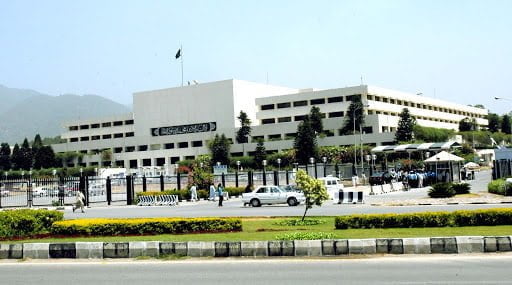Pakistan has a tumultuous constitutional history and it once again seems to be in the grip of a constitutional controversy. There are whispers that the generals are making plans to undo the 18th Amendment, passed a decade ago in 2010, that empowered to some extent the units of the Federation. Although it has been celebrated by the politicians and the media as a landmark triumph for democracy, the army was never comfortable with it due to its wish to control the country from the Centre.
The PTI-led government has passively been pushing for a review of the Amendment since coming to power. Prime Minister Imran Khan’s critics claim that the main reason he was backed was his willingness to sit as a spectator while the army controlled most of the State’s important institutions.
The issue of the 18th Amendment flared up recently when Asad Umar, the Minister for Planning and Development, openly expressed the current government’s resolve to bring it for review in the parliament. He called for giving back greater control to the federal government. On the other hand, the opposition parties have protested against the move which they think could endanger the Federation itself, saying that such efforts are aimed at facilitating direct or indirect take over of power by the military establishment.
The 18th Amendment was primarily aimed at reversing most of the previous amendments and presidential orders promulgated as part of the 1973 Constitution by General Pervaiz Musharaf. The crux of controversy include opposing views over the abrogation of the Concurrent List, the National Finance Commission Award (NFC), the devolution of power to the provinces and potential threats to democracy from the country’s mighty military that has always magically managed to creep in to control important institutions under the guise of national security.
The Amendment also did away with the Concurrent list and transferred many functions previously managed by the Federal government to the provinces. It also abrogated Article 58(2)(b) that had given the President the power to depose an elected prime minister.
The 1973 Constitution initially had three kinds of lists: the Federal list containing federal subjects, the Provincial list with subjects under the provinces and the Concurrent list with subjects that the federal and provincial assemblies can oversee. It was promised then that the functions in the Concurrent list would be transferred to the provinces after 10 years. However, the Centre remained reluctant to do that. The 18th Amendment ended the Concurrent list and transferred certain legislative and administrative powers to the provinces.
The army and the central bureaucracy have always openly detested the idea of devolution of power to the provinces. They have been passively protesting against the amendment with help from their certain political parties in the name of national interest and national security. They have also great apathy towards provincial institutional capacity to carry out functions such as managing the education, health and police departments. One of the arguments they present to support their notions is that the devolution of power would result in a lack of uniformity and unity.
The army has always pushed to tailor the education syllabuses to suit its ideology of Pakistan. It also prefers an Islamisation of school textbooks. Another argument cited in favor of the amendment is the devolution of power to the local governments. The argument is that the provinces have failed to share power with the local governments. This is a clear alibi as snatching power from the provinces and handing them over to the Centre will sink the local governments further down in the pyramid of power hierarchy. The provinces are more approachable for the local governments than a central department in Islamabad.
Also, in the heart of the issue are budgetary considerations. The 18th Amendment is widely admired for restructuring the NFC award by increasing the provinces’ share to 57 percent. Pakistan’s bludgeoning debts require a cut in the defense budget. However, instead of cuddling to the idea of a cut, the army has been pushing for a significant increase in budget allocation. To accommodate that, it has been pushing the federal government to encroach on the fiscal shares of the provinces. A reversal to the Concurrent list will not only deprive the provinces of administrative power but also the revenue generated from those departments whose control was given to them after the Amendment. That means an increase in the federal revenue to meet the army’s insatiable financial demands as Defence is a federal subject.
Whatever the outcome, one thing is for sure. The 1973 Constitution has always been used by the ruling juntas to pursue their own ambitions. The PTI as a mouthpiece of the army has got an opportunity to roll the dice at a time when the main political parties have already been weakened. The pandemic has provided them with a chance to evoke the doctrine of necessity under the guise of national interest and national security.
Even if the constitution of Pakistan remains untouched, its patchy history will always echo the words of intellectual and writer Ardeshir Cowasjee. In an article in Dawn in July 2007, he wrote: “It (the 1973 Constitution) has, throughout its life, been amended and tailored to suit the leaders of the day, and it has been an unlucky document that has brought the country no good, no stability, and has never ushered in progress or tolerance or peace.”



